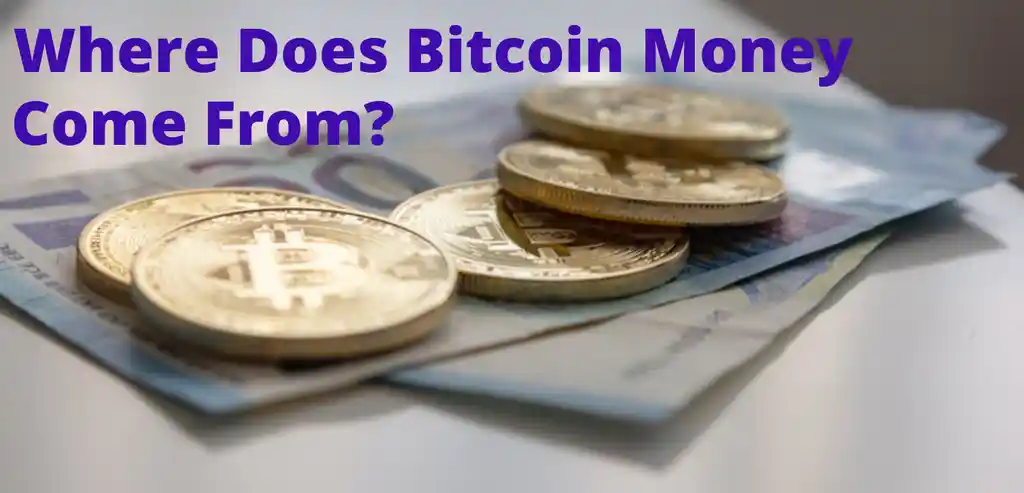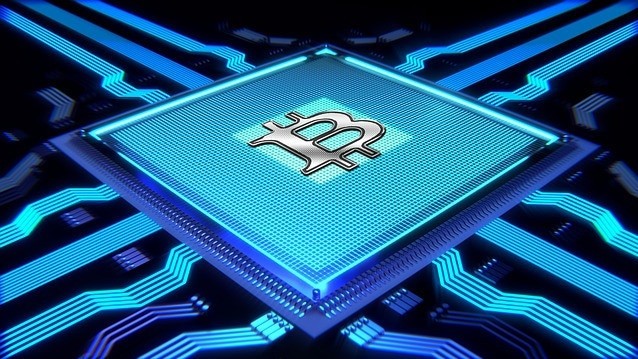
When you're new or even fairly new to crypto you might ask the question, Where Does Bitcoin Money Come From?
In order to answer this question as well as what gives bitcoin its value & what brought it to where it is today, I’m going to focus on 5 areas.
So join me below and we’ll see where this will go!
So the bitcoin code dates back to 2007. When Satoshi Nakamoto "the father of bitcoin" stated that was when the work first began on the bitcoin code. Also, like traditional gold bitcoin comes from mining, but unlike gold, bitcoin mining is digital and not physical. Finally, since bitcoin first came on the scene, there have been several things that happened to it and around it that has brought it to where it is now, which is in the financial spotlight.

It all started with the father of bitcoin, Satoshi Nakamoto.
However, even though everyone calls the developer of bitcoin Satoshi Nakamoto "the father of bitcoin", no one really knows if they're a man, a woman, or a group of people.
Now many people have claimed to be Nakamoto over the years.
Although, the true Satoshi Nakamoto whether it be he, she, or they definitely wished to remain anonymous.
So getting back to bitcoin's beginning, Nakamoto declared that work on the bitcoin code began in 2007.
Then on August 18, 2008, someone (again no one knows for sure who) registered the domain name bitcoin.org and a website was created.
After that Nakamoto published a white paper titled "Bitcoin: A Peer-to-Peer Electronic Cash System".
Later in January of 2009 Nakamoto released the open-sourced bitcoin software and created the network by mining the starting block (genesis block) of the bitcoin blockchain.
One last thing, Inside the genesis block’s coinbase, Nakamoto placed the text "The Times 03/Jan/2009 Chancellor on brink of second bailout for banks".
Some say it was meant to be a timestamp as well as a reference to the instability caused by fractional-reserve banking.

Like gold bitcoin is created through mining.
Only it is not physical mining, but digital.
Hence the term “digital gold”.
Now just so you know mining bitcoin still requires miners.
However, bitcoin miners don't use sifting pans and shovels.
A bitcoin miner uses computers to create new bitcoins and process transactions using complex and computational mathematical equations.
This is done about every 10 minutes in bundles called blocks and then added to the blockchain (basically a public ledger).
For doing this the miners receive what is called the block reward (a set amount of bitcoins).
Then nodes (computers connected to the crypto network) are used to maintain the blocks so they can be verified in the future.
Now every 210,000 blocks or approximately every 4 years the block reward
that the miners receive is halved.
So the reward started in 2009 at 50 bitcoins.
Then in 2012, it was cut in half (halved) to 25.
Next, it went to 12.5 in 2016.
The most recent bitcoin halving was in 2020 which put it at 6.25 bitcoins (BTC).
The next one is supposed to happen in 2024 and will leave the reward at 3.125 BTC.
Finally, it has been predicted that all 21 million bitcoins will be mined by 2140.
However, I’m sorry to say that none of us will be around to see it.
Unless technology, doctors, and scientists really make some leaps and bounds in medical advancement.
Who knows, maybe we’ll all just be robots with human brains or vice versa (boy wouldn’t that be scary!).
One last caveat, because of the network's use of bit-shift operators, that round decimal points to the smallest integers during halvings, they’ll probably never be 21 million bitcoins mined.
But even though, it still should be pretty close.

How does bitcoin behave (work)?
Bitcoin is basically a computer code that is stored on the bitcoin network (the blockchain).
So when you buy bitcoin or any cryptocurrency, you are issued two keys a public and a private one.
The public key is what is used to send and receive bitcoin and it is ok to share it with other people.
On the other hand, a private key is what is used to prove ownership of your bitcoin, and you should never ever share your private key with anyone.
Your public and private key will be stored in some kind of crypto wallet, probably a digital wallet.
Although there are paper wallets that are probably the safest, however, personally I always use digital ones because of their convenience.
Now as far as the blockchain (a public ledger in most basic terms) goes, it is a decentralized network so no one person or entity controls it.
It is also made up of thousands of nodes (computers) that are spread out around the world.
This makes it virtually impossible for one node to change the information stored on the network.
Since this is the case, that makes the transactions on Bitcoin's blockchain irreversible.
Which is one of the things that makes it more trustworthy.

What are bitcoin’s benefits (what gives bitcoin its advantages and value)?
Let’s start with bitcoin’s advantages.
First, its transactions are peer to peer.
That means that anyone can send and receive bitcoin to or from anyone anywhere around the globe without third-party approval if they're not using a regulated platform.
Also, when you're using bitcoin you don’t have to deal with regular banking fees associated with fiat currency (regular money).
This includes no overdraft charges, no minimum balance, or account maintenance fees among others.
Another thing, since bitcoin is a virtual/digital currency it is almost impossible for someone to steal it as long as you are the only one who knows your private key and you have that key stored in a hardware wallet or especially a paper wallet.
One more thing, like regular money, there are products and services you can purchase online using bitcoin.
Now let’s consider bitcoin’s value.
For one thing, since they’re only going to be a finite number of bitcoin (21 million), I believe that they can be used as a store of value like physical gold.
Also, since bitcoin can be transferred over the internet, satellites, and even radio waves that makes it the most portable (capable of being transported or conveyed) currency out there.
Lastly, I give you its fungibility.
This basically means that one bitcoin is equal in value to another bitcoin and that one bitcoin can be exchanged or traded for any other bitcoin.
I’m going to lay out a brief chronological history of some of the bitcoin happenings that will take you from its beginnings up until some more recent events.
2007: Satoshi Nakamoto declared that work on the bitcoin code began.
2009: The bitcoin network was created, and the first bitcoin transaction took place.
2010: The first financial bitcoin transaction was done when Laszlo Hanyecz a computer programmer had two Papa John’s pizzas delivered for 10,000 bitcoins... WOW, looking back that had to hurt! Although Hanyecz recently stated that he didn't regret it. However, I can't see how you don't regret (at least a little bit) spending what would amount to about $475,000,000 based on bitcoins price today on 2 pizzas. Anyway, A lot of cryptocurrency supporters call May 22 pizza day because May 22, 2010, was the day he purchased the pizzas.
2011: Computer programmers (coders) began to improve Bitcoin's blockchain code, as well as miners and coders, also started to build other networks like Ethereum and Litecoin.
2012: The Bitcoin Foundation was started to promote a greater understanding of bitcoin and its development.
2013: Chinese financial institutions were prohibited from using bitcoin by the People’s Bank of China. This led Baidu to stop accepting bitcoin for certain services.
2014: the Wikimedia Foundation started accepting bitcoin donations.
2018: China completely bans bitcoin trading.
2019: The owner of the NYSE “the Intercontinental Exchange” began trading of bitcoin futures on its exchange called Bakkt.
2020: An announcement was made by PayPal that United States users could buy, sell, or hold bitcoin.
2021: El Salvador became the first country to make bitcoin legal tender beside the U.S. Dollar. Also, on October 19, 2021 ProShares Launched BITO, the First Bitcoin ETF in the United States. One more thing, according to (Bloomberg.com) BITO was the quickest ETF to reach $1,000,000,000 in assets under management.
Video Version: What Are Bitcoin's Beginnings? From Then Until Now!
First, the origins of bitcoin can be traced back to 2007. That’s when Satoshi Nakamoto (the father of bitcoin) declared work began on the bitcoin code. Next, like physical gold bitcoins are acquired through mining, except when it comes to bitcoin the mining process is digital. Another thing, because bitcoin is a virtual/digital currency there are products and services that can be purchased with it online. Also, there are a lot of things that happened concerning bitcoin over the years such as the bitcoin foundation being started which brought it to where it is today. Finally, since bitcoin is finite some people including me think of it and use it as a store of value, however as of now it is still pretty volatile. So in this post we discovered where bitcoin money came from, a few of the things that give it value, and some of the happenings that brought it to where it is today.